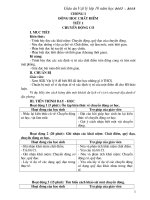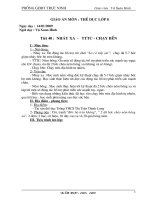Giao an Hoi giang tinh 2007 2008
Bạn đang xem bản rút gọn của tài liệu. Xem và tải ngay bản đầy đủ của tài liệu tại đây (392.33 KB, 14 trang )
<span class='text_page_counter'>(1)</span><div class='page_container' data-page=1>
LESSON PLAN
<i>Period: 79 UNIT 12: (Cont)</i>
LANGUAGE FOCUS
1/ Objectives: By the end of the lesson, Students will be able to understand and use the
past progressive and the present progressive with “always”.
2/ Language contents:
a) Grammar: The past progressive; The present progressive with “always”
b) Vocabulary: race, drum, cheer
3/ Techniques: chains in chains, eliciting, question and answer, pair work, group work,
correction, matching
4/ Teaching aids: projector
5/ Procedures:
<b>STAGES/</b>
<b>TIME</b> <b>CONTENTS</b> <b>NOTES</b>
<b>* Warm-up:</b>
(5 minutes) <b>* Chains in chains: (A:</b> I always go to school early.<i><b>Telling habits)</b></i>
<b>B:</b> I often play soccer in the afternoon.
…
<b>* eliciting:</b>
He is always working.
Ss: <b>Group A – Group B</b>
(Two representatives of each
group tell their habits.)
- remind the adverbs of
frequency.
- remind the sentence with
<i><b>“always” in the dialogue</b></i>
between Mrs. Smith and Mrs.
Quyen.
Ss: find and tell.
T: introduce another use of
“always” to Ss and lead in the
new lesson.
<b>1/ Activity 1: </b>
(10 minutes) <b>I. Present progressive with “always”:* Examples:</b>
- He <b>is </b><i><b> always </b></i><b> working</b>.
- Son <b> is </b><i><b>always</b></i><b> going</b> to school late.
<b>* Form: </b>
<b>* Practice:</b>
<b>Exercise3:</b><i><b> Look at the pictures. Write</b></i>
<i><b>the sentences. Say what the people are</b></i>
<i><b>always doing.</b></i>
a) Bao is always forgetting his homework.
b) Mrs. Nga is always losing her umbrella.
T: gives Ss some short films of
Son.
Ss: watch the films.
T: gives Ss one more example.
Ss: remark examples and tell
the form.
T: remark.
T: gives Ss the exercise 3.
T: guides Ss to do sentence
<i>“a” for picture a.</i>
Ss: work in groups.
</div>
<span class='text_page_counter'>(2)</span><div class='page_container' data-page=2>
c) Mr. and Mrs. Thanh are always missing the
bus.
<i><b>* Note: “Always” used in the present</b></i>
progressive to express a complaint.
d) Nam is always watching TV.
e) Na is always talking on the phone.
f) Liem is always going out.
<b>* Further practice:</b>
Talking about classmates/ friends/
family/relatives/neighbors/ …
<b>* Singing:</b>
“I was reading books at 8 o’clock last night.
And my parents were watching TV.”
T: takes feedback and corrects
sentences “b and c”.
Ss: give their remarks on
using.
T: remarks and gives Ss the
note.
Ss: make sentences “d,e, f”.
T: corrects.
T: gives Ss more situations.
Ss: practice saying.
T: corrects/ remarks.
T: sings and asks Ss about it.
Ss: tell what they hear.
T: shows it to Ss.
lead in the past progressive.
(activity2)
<b>2/ Activity 2:</b>
(20 minutes) <b>II. Past progressive:* Examples: </b>
- I was reading books at 8 o’clock last night.
- My parents were watching TV at 8 o’clock last
night.
<b>* Form:</b>
<b>* Practice:</b>
<b>Exercise 1:</b> <i><b>Look at the pictures. Say</b></i>
<i><b>what each person was doing at eight</b></i>
<i><b>o’clock last night.</b></i>
a) Ba was taking a shower at eight
o’clock last night.
b) Hoa was eating (dinner) at eight o’clock last
night.
c) Bao was reading at eight o’clock last night.
d) Nga was writing a letter at eight o’clock last
night.
<b>* Use:</b> used to express an action going
on in the past at a definite time.
e) Na was walking with her dog at eight o’clock
last night.
f) Lan was talking to her grandmother at eight
o’clock last night.
<b>* Further practice:</b>
<i><b>Talking about them/ their family/</b></i>
T: gives Ss two examples.
Ss: remark and gives the form.
T: gives Ss the exercise 1.
T: gives Ss the modal sentence
for picture a.
Ss: look at the rest pictures and
work in groups.
T: takes feedback and corrects
the sentences “b,c,d”.
Ss: remark and tell the use.
</div>
<span class='text_page_counter'>(3)</span><div class='page_container' data-page=3>
<i><b>friends/...</b></i>
<b>Past progressive with when and while.</b>
<b>* Examples:</b>
- Tom was reading a book when the bell rang.
- When Tom was reading a book, the bell rang.
- While Tom was reading a book, the bell rang.
<b>Exercise 2: </b><i><b>Look at the pictures. Then</b></i>
<i><b>match the half-sentences in column A to</b></i>
<i><b>those in column B. Write the full</b></i>
<i><b>sentences in your exercise book.</b></i>
<i>* New words:</i>
- race (n):
- drum (n):
- cheer (v):
a) – C : The Le family was sleeping
when the mailman came.
b) – F
c) – E
d) – B
e) – D
f) – A
<i>* Notes: </i>
- used to express an action was in
progress when another happened.
- The action in progress is used with the
past progressive; the action happening
suddenly is used with the past simple.
Continuous action action happened
T: guides Ss to say by saying
modally or asks Ss some
questions:
-“I was watching TV at eight
<i>o’clock last night.” </i>
<i>- what were you doing at that</i>
<i>time?</i>
<i>- What were you doing at 7 o</i>
<i>clock yesterday morning?</i>
<i>- …. </i>
Ss: practice saying.
T: listens and remarks.
T: gives Ss a short cartoon of
“Tom and Jerry”.
Ss: see and answer:
<i>“What was Tom doing when the</i>
<i>bell rang?</i>
T: introduces and notices two
actions in the examples with
<i>when and while to Ss. </i>
T: explains how to use when
and while to Ss.
Ss: notice and do exercise 2.
T: gives Ss some new words.
- picture
- picture
- action and face
T: guides Ss to do.
Ss: work in groups and match.
T: takes feedback, corrects and
gives the answer keys..
Ss: give the second use of the
past progressive.
</div>
<span class='text_page_counter'>(4)</span><div class='page_container' data-page=4>
Past progressive simple past
<b>* Further Practice: </b>
<i><b>Choose a film and give your sentence</b></i>
<i><b>about it. </b></i>
<i><b>* cues:</b></i>
- sing/ come
- walk/ meet
- sleep/ come and leave a letter
- dance/ ring
<b>* Answer keys:</b>
a/ She was singing when the fish
came/appeared.
b/ While she was walking/jogiing in the park,
she met her friend, Nam.
c/ While Tom was sleeping, Jerry came and left
him a letter.
d/ When they were dancing, the telephone
rang.
when.
T: remarks and gives Ss the
note.
Ss: write down.
T: shows four short films to Ss.
Ss: watch the films frist.
T: gives Ss some cues about
these films.
Ss: choose, watch again and
give sentences.
T: corrects and give the answer
keys.
<b>*Consolidation:</b>
(7 minutes)
<b>Choose the best answer:</b>
1/ Lan _______ books at 9 o’clock yesterday morning.
<b>A.</b> read <b>B.</b> is reading
<b>C.</b> were reading <b>D.</b> was reading
2/ We were studying math _______ he came.
<b>A.</b> when <b>B.</b> which
<b>C.</b> while <b>D.</b> at that time
3/ <b>A:</b> May I watch TV, Mom?
<b>B:</b> You _______ TV. You should do something more
active.
<b>A.</b> don’t watch <b>B.</b> are watching
<b>C.</b> are always watching <b>D.</b> Were watching
4/ While I was writing, he _______ .
<b>A.</b> arrived <b>B.</b> is arriving
<b>C.</b> were arriving <b>D.</b> All are correct.
5/ Nam is a naughty boy, he _______ at the girls.
<b>A.</b> laugh <b>B.</b> is always laughing
<b>C.</b> always is laughing <b>D.</b> All are correct.
<b>* Answer keys:</b>
1/ <b>D</b> 2/ <b>A</b> 3/ <b>C</b> 4/ <b>A</b> 5/ <b>B</b>
Ss: do in 3 minutes.
T: takes in and corrects
<b>* Homework:</b>
(3 minutes)
Rewrite down all exercises in the notebooks.
Notice the past progressive and “always” in
the present progressive.
Do exercise 6 in the exercise book.
Prepare new lesson: Unit 13: Festival
(Getting started + Listen & Read)
<i>* New words:</i>
<i>- </i> competition - participate - yell - judge
* Compound words: fire-making, rice-coking,…
<i>* Websides:</i>
-
-
T: explains and guides
homework to Ss.
T: introduces Ss two websides
of festivals so that they can get
more information on festivals.
<b> Check:</b>
Dong Hoa, March 17th <sub>2008</sub>
<i><b>Teacher</b></i>
</div>
<span class='text_page_counter'>(5)</span><div class='page_container' data-page=5></div>
<span class='text_page_counter'>(6)</span><div class='page_container' data-page=6>
LESSON PLAN
<i>Period: 73 UNIT 12: (Cont)</i>
A3
Teacher : Nguyen Minh Chinh
School : Truong Chinh Secondary School
Office : Dong Hoa Education and Training Office
Teaching date : March 19th<sub>, 2008</sub>
Teaching class: 8A – Tran Quoc Toan Secondary School
Teacher: Nguyen Minh Chinh
School : Truong Chinh Secondary School
Teaching date : March5th<sub>, 2008</sub>
Teaching class: 7E – Luong Tan Thinh Secondary School
1/ Objectives: By the end of the lesson, Students will be able to how to cook and have
some new words.
2/ Language contents:
c) Grammar: The past simple; The adverbs: first, next, then, after that, finally(review)
d) Vocabulary: slice, green pepper, boil, add, soy sauce, dish, plate, bowl, chopsticks,
spoon, pan, stir-fired, dish, recipe
3/ Techniques: eliciting, net-work, question and answer, pair work, group work,
correction, fill in gap
4/ Teaching aids: projector, real things
5/ Procedures:
<b>STAGES/</b>
<b>TIME</b> <b>CONTENTS</b> <b>NOTES</b>
<b>* Warm-up:</b>
(5 minutes) <b>* Networks: </b><i><b>Kinds of food Hoa and her aunt bought</b></i>
<i><b>yesterday.</b></i>
beef spinach
cucumbers oranges
Ss: <b>Group A - Group B</b>
- Write what kinds of food Hoa
and her aunt bought when they
went to the market yesterday.
T: remarks the game and tells
the winner.
<b>1/ </b>
<b>Pre-Reading: </b>
(15 minutes)
<b>* Pre questions:</b>
1/ Did they use these kinds of food to
prepare for dinner?
2/ Did Hoa’s aunt slice the beef, the
spinach and the cucumbers?
3/ Did she make cucumber salad?
4/ Did she cook rice?
T: asks asks Ss some questions
to lead in the new lesson.
Ss: answer.
<i>Lead in: </i>
</div>
<span class='text_page_counter'>(7)</span><div class='page_container' data-page=7>
5/ Did Hoa help her to cook?
<b>Unit 12: Let’s eat (A3)</b>
<b>* New words:</b>
- slice (v):
- green pepper (n)
- pan (n):
- boil (v):
boiled spinach:
- stir-fry (v):
stir-fried beef
- add (v):
- taste (v):
- soy sauce (n):
- dish (n):
Ex: Banh xeo is my favorite dish.
- set the table (n):
- plate (n):
- bowl (n):
- chopsticks (n):
- spoon (n):
<b>* Checking the words:</b>
what they did and How they
prepared, We study “A3”.
T: plays the disk.
Ss: listen twice.
T: presents some new words.
- action
- real thing
- picture
- picture
- action & picture
- picture
- explanation
- action
- real thing
- example
- picture
- picture
- picture
- picture
- real thing
* Reading the new words.
T: asks Ss/ shows actions/ uses
real things.
Ss: answer.
T: corrects.
<b>2/ While- </b>
<b>Reading:</b>
(10 minutes)
<i><b>a) Answer the question:</b></i>
What did Hoa, her aunt and uncle have for
dinner? Write the menu.
Menu
Cucumber salad with onions
Boiled sipnach
Stir-fried beef with green peppers
and onions
Rice
<i><b>b) Here is the recipe Hoa’s aunt used. Add</b></i>
<i><b>the missing verbs.</b></i>
<i><b> Then match the instructions to the</b></i>
<i><b>pictures.</b></i>
- recipe (n)
<b>* Add the missing verbs.</b>
1/ Slice the beef.
T: tell Ss the request.
Ss: work in groups.
T:- checks/ takes feedback.
- gives the keys.
T: tell the request to Ss.
</div>
<span class='text_page_counter'>(8)</span><div class='page_container' data-page=8>
2/ Slice the green pepper and onions.
3/ Heat the pan.
4/ Stir-fry the beef.
5/ Add some soy sauce to the dish.
6/ Cook rice.
7/ Add salt to the spinach.
<b>* Match the instructions to the pictures.</b>
1 – c 5 – b
2 – f 6 – e
3 – a 7 – g
4 – d
<b>* Telling what Hoa’s aunt prepared for</b>
<b>dinner.</b>
<i><b>* Example:</b></i>
- First, she sliced the beef.
- Next, she sliced some green peppers and
onions.
- …
<i><b>* Note: Using: First, Next, Then, And then,</b></i>
After that, Finally
T:- corrects.
- gives the answer keys.
T: tells Ss the request.
Ss: work in groups and match.
T: takes feedback and gives the
answer keys.
T: tells Ss the request and guides
Ss to tell.
T: makes modally.
T: gives Ss the note.
Ss: notice and tell by looking at
the pictures and using the
instructions.
T: calls some Ss to check, praise
and gives marks.
<b>3/ Post- </b>
<b>Reading:</b>
(12 minutes)
<b>* Chatting:</b>
- Do you like cooking?
- Do you often cook?
- What do you often cook?
<b>* Telling how to cook/ make ….</b>
Stir-fried beef with green peppers
and onions
Cucumber salad
T: asks Ss some questions about
cooking.
Ss: answer.
T: asks Ss to tell how to cook
these dishes again.
Ss: choose the dish and work in
groups.
T: checks, remarks and gives
marks.
<b>*Homework:</b>
(3 minutes)
Learn vocabularyby heart.
Read the text again and write
all in the notebooks.
Practice saying how to cook the
dishes again.
<b> Check: </b> Hoa Hiep Bac, March 4th <sub>2008</sub>
STAGE
</div>
<span class='text_page_counter'>(9)</span><div class='page_container' data-page=9>
<b></b>
<b>Warm-up:</b>
<b>* Chains in chains: </b>
<b>A:</b> I always go to school early.
<b>B:</b> I often play soccer in the afternoon.
…
T: Goodmorning class
Ss: Goodmorning teacher.
T: I’m very happy to introduce you:
-Mrs. Thu, she’s from PY education and
trainging Service.
-Mrs. Thao, she comes from PY Univirsty.
- And many, many teachers visiting our class.
<i><b>Now welcome to our class!</b></i>
- I’m Chinh. I’m from Truong Chinh Secondary
School, Dong Hoa district.
- And what’s your name?
Ss: My name’s Hoa.
T: How are you?
Ss: I’m fine.
T: What time do you often go to school?
Ss: at 6.30
T: I often get up early and always go to school
at 6.30.
- That is my habit. And how about you?
- Tell me about your habits.
<i><b>- Do you like to play a game?</b></i>
Ss: yes.
- You have 2 groups:
<b>Group A – Group B</b>
- Two representatives of each group go to the
baord and tell me)
- Who are the representative of Group A and
who are the presentative of Group B.
- Now come here.
- One supervisor for one group.
- Group A: who - group B: who
- You supervise group A and you supervise
group B.
- Are you ready? – Start!
Ss: play.
T:right/ good/ is it right, class?/ Continue/ go on
(nhớ hỏi lớp và nguời giám sát)
- nhận xét trò chơi.
- who are the winner? Group A or B
- Is he good?
- Well done. / Clap your hands please!
- Khi các bạn nói về thói quen các bạn đã sử
dụng những trạng từ gì?
</div>
<span class='text_page_counter'>(10)</span><div class='page_container' data-page=10>
<b>* eliciting:</b>
He is always working.
- OK./ Is it right class?
- Một trong những trạng từ đó có trạng từ
<b>“Always”.</b>
- Do you remamber the dialouge between Mrs.
Smith and Mrs. Quyen?
Ss: yes.
- There is a sentence with “always” in it.
- What’s sentence?
Ss: <b>“He is always working.”</b> (cho lên màn
hình)
- Ok! right./ Good
- Và “Always bây giờ được sử dụng ở thì nào?
Ss: thì hiện tại tiếp diễn.
- Good. Vậy “always” khi được dùng với thì
hiện tại tiếp diễn nó sẽ diễn tả đièu gì?
- It is one of two contents we study today. Now,
to understand more about them, we study
Unit12.
- Giáo viên ghi bảng.
<b>1/ </b>
<b>Act1: </b>
<b>I. Present progressive with “always”:</b>
<b>* Examples:</b>
- He <b>is </b><i><b> always </b></i><b> working</b>.
- Son <b> is </b><i><b>always</b></i><b> going</b> to school late.
<b>* Form: </b>
<b>* Practice:</b>
<b>Exercise3:</b><i><b> Look at the pictures. Write</b></i>
<i><b>the sentences. Say what the people are</b></i>
<i><b>always doing.</b></i>
a) Bao is always forgetting his homework.
b) Mrs. Nga is always losing her umbrella.
c) Mr. and Mrs. Thanh are always missing the bus.
<i><b>* Note: “Always” used in the present</b></i>
progressive to express a complaint.
d) Nam is always watching TV.
e) Na is always talking on the phone.
f) Liem is always going out.
<b>* Further practice:</b>
Talking about classmates/ friends/
family/relatives/neighbors/ …
- Now look at the screen and watch a short film.
It’s about Son.
- On Monday, Son is late for school.
- On Tuesday, Is he late for school too, class?
- On Wednesday, he’s late for school.
- so he always go to school late.
- cho hs ví dụ:Son <b>is </b><i><b>always</b></i><b> going</b> to school
late.
- The whole class. Look at these example,
remark and give me the form.
Ss: tell the form.
- Now you have exercise 3.
- cho ví dụ a.
- hs làm nhóm (1 bàn) (2 phút)
- sữa câu b, c và cho hoc sinh nhận xet cách
dùng.
(OK. Now. Who can give me the use?)
- cho hoc sinh ghi chú về cách dùng.
- tiếp tục sữa câu d,e,f
- đưa tình huống:
“ My friend, Tuan is always drinking coffee
</div>
<span class='text_page_counter'>(11)</span><div class='page_container' data-page=11>
and smoking cigarette.”
- How about your classmates/friends/ family/ ...
- hát và dẫn dắt vào phần 2.
Now listen to my song:
“- I was reading books at 8 o’clock last night.
- My parents were watching TV at 8 o’clock last night.
“
- Is it interesting? I composed it. Can you hear
it? Who can repeat it again?
- Hs nói.
- giáo viên cho lên màn hình
<b>2/ Act </b>
<b>2:</b>
<b>II. Past progressive:</b>
<b>* Examples: </b>
- I was reading books at 8 o’clock last night.
- My parents were watching TV at 8 o’clock last
night.
<b>* Form:</b>
<b>* Practice:</b>
<b>Exercise 1:</b> <i><b>Look at the pictures. Say</b></i>
<i><b>what each person was doing at eight</b></i>
<i><b>o’clock last night.</b></i>
a) Ba was taking a shower at eight
o’clock last night.
b) Hoa was eating (dinner) at eight o’clock last night.
c) Bao was reading at eight o’clock last night.
d) Nga was writing a letter at eight o’clock last night.
<b>* Use:</b> used to express an action going
on in the past at a definite time.
e) Na was walking with her dog at eight o’clock last
night.
f) Lan was talking to her grandmother at eight o’clock
last night.
<b>* Further practice:</b>
<i><b>Talking about them/ their family/</b></i>
<i><b>friends/...</b></i>
<b>Past progressive with when and while.</b>
<b>* Examples:</b>
- Tom was sleeping when the bell rang.
or While Tom was sleeping, the bell
rang.
<b>Exercise 2: </b><i><b>Look at the pictures. Then</b></i>
Hs: nhận xét was và were và đưa ra cấu trúc.
- “Who can give me the form?”
<b>- Chủ ngữ khi nào dùng was và were.</b>
- Now you have exercise 1.
- đưa câu mẫu a.
Ss: look at the rest pictures and work in pairs.
(2’)
- sữa “b,c,d”.
- “Now who can give me the use.”
- hs: đưa ra cáh dùng.
- Tiếp tục sũa câu “e, f”.
T: guides Ss to say by saying modally or asks Ss
some questions:
-“I was watching TV at eight o’clock last night.”
<i>- what were you doing at that time?</i>
<i>- What were you doing at 7 o clock yesterday</i>
<i>morning?</i>
<i>- …. </i>
- Now look at the screen and watch a cartoon.
Do you like to see a cartoon? <b>“Tom and</b>
<b>Jerry”</b>.
Ss: see and answer:
<i>“What was Tom doing when the bell rang?</i>
- xem và trả lời <b>“ Tom was sleeping.”</b>
</div>
<span class='text_page_counter'>(12)</span><div class='page_container' data-page=12>
<i><b>match the half-sentences in column A to</b></i>
<i><b>those in column B. Write the full</b></i>
<i><b>sentences in your exercise book.</b></i>
<i>* New words:</i>
- race (n):
- drum (n):
- cheer (v):
a) – C : The lee family was sleeping
when the mailman came.
b) – F c) – E d) – B
e) – D f) – A
<i>* Notes: </i>
- used to express an action was in
progress when another happened.
- The action in progress is used with the
past progressive; the action happening
suddenly is used with the past simple.
<b>* Further Practice: (playing a game) </b>
<i><b>Choose a film and give your sentence</b></i>
<i><b>about it. </b></i>
<b>* Answer keys:</b>
a/ She was singing when the fish came.
b/ While she was walking in the park, she met
her friend, Nam.
c/ While Tom was sleeping, Jerry came and left
a letter.
d/ When they were dacing, the telephone rang.
T: introduces and notices two actions in the
example with when and while to Ss.
Ss: notice and do exercise 2.
T: gives Ss some new words.
- picture
- picture
- action and face
Ss: laøm nhóm (2 bàn)
- sữa sai và cho học sinh nhận xét nêu cách
dùng.
- giải thích thêm cho học sinh 2 hành động với
When và While, vị trí, …
- cho hoïc sinh ghi. (write down.)
Ss: <b>Group A and Group B</b>
Now the whole class play the game.
- cho học sinh làm nhóm chọn và ghi điểm (2đ)
<i><b>(Giáo viên ghi diểm lên bảng) NHỚ!</b></i>
Phần dặn dò học sinh
<b>*Con:</b> <b>Choose the best answer:</b>
1/ Lan _______ books at 9 o’clock yesterday morning.
<b>A.</b> read <b>B.</b> is reading
<b>C.</b> were reading <b>D.</b> was reading
2/ We were studying _______ he came.
<b>A.</b> when <b>B.</b> which
<b>C.</b> while <b>D.</b> at that time
3/ <b>A:</b> May I watch TV, Mom?
<b>B:</b> You _______ TV. You should do something more
active.
<b>A.</b> don’t watch <b>B.</b> are watching
<b>C.</b> are always watching <b>D.</b> Were watching
4/ While I was writing, he _______ .
<b>A.</b> arrived <b>B.</b> is arriving
<b>C.</b> were arriving <b>D.</b> All are correct.
5/ Nam is a naughty boy, he _______ at the girls.
<b>A.</b> laugh <b>B.</b> is always laughing
<b>C.</b> always is laughing <b>D.</b> All are correct.
- phát đề
- học sinh làm 3 phuùt
</div>
<span class='text_page_counter'>(13)</span><div class='page_container' data-page=13>
<b>* Game: </b>
- get up/ go to school/ go to bed/ read books/ watch TV/ listen to music/ play games/ play
soccer/ play volleyball/ play table tennis/ play game online/ vv…
- do homework/ do household/ help my mom/clean the house/ wash clothes/ vv…
- go swimming/ go shopping/ go jogging/ go fishing/ vv…
Ex: - I always get up early.
- I usually do my homework in the evening.
- I often go shooping with my friend.
- I always listen to music.
<b>* Always với thì hiện tại tiếp diễn:</b>
- Thực hành nói phàn nàn về bạn cùng lớp, về bạn, về gia đình, hành xóm.
x: - Nam is always talking in the class.
- Tuan is always making noise in the class.
- Hoa is always fogetting her homework.
- My father is always smoking cigarrete/ drinking beer.
<b>* Song:</b>
- H/s nghe và nói: “I was reading books at 8 o’clock last night.”
<b>* Past progressive:</b>
- Form:
- Uses:
1/ Dùng diễn tả 1 hành động xẩy ra tại một thời điểm xác định trong quá khứ.
Eõx: I was reading books at 8 o’clock last night.
2/ Dùng diễn tả 1 hành động đang liên tục ở quá khứ thì 1 hành động khác bất ngờ xẩy
ra.
Ex: - Tom was sleeping when the bell rang.
or <b>When</b> Tom was sleeping , the bell rang.
<b>While</b> Tom was sleeping , the bell rang.
<i><b>* Exercise: Xem phim và nói (4 đoạn)</b></i>
<b>1/ She was singing when the fish came/ appeared.</b>
<b>2/ While she was walking/ jogging in the park, she met her friend, Nam.</b>
<b>3/ While Tom was sleeping, Jerry came and left a letter.</b>
<b>4/ When they were dacing, the telephone rang.</b>
<b>* Choose the best answer: </b>- Hướng dẫn cách làm cho h/s; cách kích chuột khi sữa.
- A, B, C, or D
</div>
<span class='text_page_counter'>(14)</span><div class='page_container' data-page=14></div>
<!--links-->









